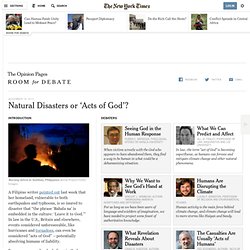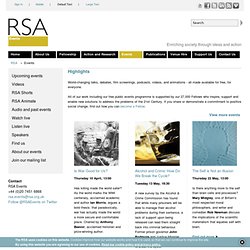

Talking past each other: Bill Nye vs. creationist Ken Ham on evolution. PETERSBURG, KENTUCKY—A brightly lit auditorium was packed with young adults wearing bow-ties, young-Earth creationists, and a gaggle of media there to maybe see sparks fly.

The sparks could have been generated by Ken Ham, president/CEO of Answers in Genesis and the Creation Museum, and Bill Nye the Science Guy, but instead, they mostly talked past each other for two-and-a-half hours on a snowy Kentucky night. The topic was one near and dear to both debate participants: the nature of acceptable scientific discourse.
More specifically, they attempted to answer the question “is creation a viable model of origins in today’s modern scientific era?” How to do anything.
Subscribe to New Scientist. Humans Are Disrupting the Climate - Room for Debate. Lucas F.

Johnston, an assistant professor of religion and environmental studies at Wake Forest University, is the author of "Religion and Sustainability: Social Movements and the Politics of the Environment. " Severe weather is becoming increasingly frequent and intense, and that’s happening for a reason. So it matters whether we think of God or humans as being responsible. We cannot conclusively link individual weather events to human disruption of the climate, but we do believe that human activity is the main force behind climate change and that climate change will lead to more “super storms” like Haiyan and Sandy.
'Acts of God' Is a Distraction From Human Responsibility - Room for Debate. Ted Steinberg, a professor of history and law at Case Western Reserve University, is the author of "Acts of God: The Unnatural History of Natural Disaster in America" and the forthcoming "Gotham Unbound: The Ecological History of Greater New York.

" What Revelation Reveals About Disasters - Room for Debate. Even among believers who take an apocalyptic worldview, the connection between God and disasters is complex and controversial.

There are certain forms of apocalyptic thinking that assume disasters are acts of divine judgment against a sinful humanity. Why We Want to See Disasters as Acts of God - Room for Debate. Human beings are made anxious, even traumatized, by the unexpected, especially events that wreak havoc and take lives — like the dozens of tornadoes in the U.S.

Midwest this weekend or the even more devastating typhoon that ravaged the Philippines recently. Such disasters of epic scale, and also the more common shocks and tragedies closer to home, beg for explanation of some sort. Describing ourselves as Homo sapiens, as beings who know they know, we simply cannot tolerate not knowing — not knowing why and by whose hands tragic events happen, not being able to explain the seemingly inexplicable. See God in the Response, Not the Disaster - Room for Debate. Ruben C.

Mendoza is an associate professor of theology at Ateneo de Manila University. Natural Disasters or 'Acts of God'? - Room for Debate. Kevin Frayer/Getty ImagesBurning debris in Tacloban, Philippines.

A Filipino writer pointed out last week that her homeland, vulnerable to both earthquakes and typhoons, is so inured to disaster that “the phrase ‘Bahala na’ is embedded in the culture: ‘Leave it to God.’” In law in the U.S., Britain and elsewhere, events considered unforeseeable, like hurricanes and tornadoes, can even be considered “acts of God” – potentially absolving humans of liability. Even among people who believe in God, faulting a deity for the mass destruction of natural disasters is controversial. Bible Hub: Search, Read, Study the Bible in Many Languages. Litemind - Exploring ways to use our minds efficiently. Events. Highlights World-changing talks, debates, film screenings, podcasts, videos, and animations - all made available for free, for everyone.

All of our work including our free public events programme is supported by our 27,000 Fellows who inspire, support and enable new solutions to address the problems of the 21st Century. If you share or demonstrate a commitment to positive social change, find out how you can become a Fellow. Is War Good for Us? Thursday 10 April, 13:00. The Science Network. Panel 3: How Does Life Originate and How Do We Recognize It? The Science Network. Reexamining the myth of no-fault capitalism. Actually, those blasts weren’t coming from President Obama.

That was Romney’s competition for the Republican nomination, sounding like a speakers’ lineup at an Occupy Wall Street rally. Now, I predict, will come a furious attempt by the GOP to unring the economic justice bell. Damage control efforts began with Newt Gingrich backing away from his sharp-fanged criticism of Romney’s record at Bain Capital, the investment firm he led. Don’t attack the GOP front-runner for being a ruthless, heartless corporate raider, Gingrich announced, but rather for not being conservative enough. This admonition came as a pro-Gingrich political action committee continued to blast Romney as a ruthless, heartless corporate raider. Is capitalism moral? For most of the past 30 years, the world has been moving in the direction of markets.

The grand experiment with communism has been thoroughly discredited, a billion people have been lifted from poverty through free-market competition, and even European socialists have given up on state ownership and the nanny state. Here at home, large swaths of the economy have been deregulated, and tax rates have been cut. A good portion of what is left of government has been outsourced, while even education is moving toward school choice. In embracing welfare reform, Americans have acknowledged that numerous programs meant to lift up the poor instead trapped them in permanent dependency and poverty. But more recently, we’ve seen another side of free markets: stagnant incomes, gaping inequality, a string of crippling financial crises and 20-somethings still living in their parents’ basements. Many of those leading this intellectual campaign can be found here in Washington.
The business of altruism. Smith, however, was also conscious of the power of altruism. He could have been describing the scene in Boston when he wrote in 1759: “The plaintive voice of misery, when heard at a distance, will not allow us to be indifferent about the person from whom it comes. As soon as it strikes our ear, it interests us in his fortune, and, if continued, forces us almost involuntarily to fly to his assistance.” Smith devoted a book, “The Theory of Moral Sentiments,” to explaining why widespread altruism is the natural and unavoidable consequence of the human ability to empathize with others. A century later, Charles Darwin laid out a theory of natural selection based on the struggle for individual survival. C. S. Lewis, Evangelical Rock Star. Lewis’s remarkable combination of theological simplicity and tweedy British scholarship is no doubt one reason for his appeal.
In his famous book “Mere Christianity,” adapted from a series of BBC radio talks during World War II, Lewis laid out a clear assertion of what it meant to be Christian. Molly Worthen, a historian of religion, points out that nearly a century after the Scopes trial, many evangelicals still worry that secular intellectuals regard them as country bumpkins. Christians like Lewis have helped to keep that sense of cultural inferiority at bay. Obama’s German Storm. Beyond the Brain.
How to be More Productive Under Stress. Got stress? If you’re like 75% of other Americans, you’ve experienced moderate to high levels of stress in the past month, and often lie awake at night because of it. Trying to balance the demands of your work and family life can stretch even the strongest among us to the breaking point. But there is a way to be successful and productive even when under stress, says Sharon Melnick, PhD and author of “ Success Under Stress: Powerful Tools for Staying Calm, Confident, and Productive When the Pressure’s On .” In her book she writes that stress is not necessarily the result of too much work or continual interruptions, but rather when the demands of your situation exceed your perceived ability to control them. Why Can't America Be Sweden? Tom Edsall on politics inside and outside of Washington. Rob Schoenbaum for The New York Times Do these Swedes lack innovation? Daron Acemoglu, an eminent economist at M.I.T., has ignited a firestorm by arguing that contemporary forces of globalization bar the United States from adopting the liberal social welfare policies of Scandinavian countries.
Belief Is the Least Part of Faith. These are the questions that university-educated liberals ask about faith. They are deep questions. 3.7 Überblick über das System der Einkommensteuer (Personal Tax) - Steuern in Japan - Gesetze & Vorschriften - Aufnahme einer Geschäftstätigkeit in Japan - Investieren in Japan. Kapitel 3. Christianity, history and liberty: Constantine's cross. TODAY IS the date when many Christians commemorate Emperor Constantine the Great and his mother Helen, central figures in the late Roman empire's conversion to Christianity. Left-Right Religion? The faithful must learn to respect those who question their beliefs.
Outward displays of belief in God have become a proxy for trustworthiness in the US. Photograph: Matt Rourke/AP Issues of personal faith can be a source of respectful debate and discussion. Podcasts and Downloads - Heart and Soul: Faith Perspectives. C. S. Lewis Quotes. Grow the life you want. The best time to plant a tree was 20 years ago. Projects & Activities.
Espresso for the Mind. Front Row at the Dawn of Time. Science vs. Religion: 50 Famous Academics on God. Stupidity: What makes people do dumb things - life - 01 April 2013. Five reasons to believe that Jesus Christ rose from the dead. The Unreasonable Effectiveness of Mathematics in the Natural Sciences. Reading Materials. On Being Catholic.